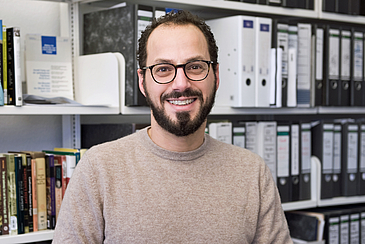Today is a special day for Dr. Roy Karadag. “My little daughter is crawling,” happily exclaims the father on parental leave. Until the end of August 2019, the political scientist will only be able to perform his duties at the Institute for Intercultural and International Studies (InIIS) to a limited extent. A self-imposed at that: with the support of his team, Roy Karadag has been offering political consultation hours for citizens for a year now.
“Paid to Read”
Without any bureaucratic hurdles – a registration by e-mail or a telephone call suffices. Individual interested parties have already made their way from the city to his office at Unicom. “There was also a small group of students who asked me questions about their project work on global trade.” The scientist is convinced that discussions on political topics are tricky for many people. “They are afraid to expose themselves to ignorance and inexperience.” He himself is paid to read. He could explain many things in a personal conversation and respond individually to questioners.
Sharing Knowledge
It goes without saying that Roy Karadag sees it as his duty to do public relations work and to pass on his knowledge. Tagesschau, Deutschlandradio, WDR, Hessischer Rundfunk, Wirtschaftswoche, taz and Kölner Stadt-Anzeiger: This man is present in the media in an unagitated way. His special topics are Islam, conflicts in the Middle East, and Turkey. Only recently, he spoke in a police training course in Münster about why the relationship between Germany and Turkey is so tense.
Wish: Political Consulting Hours in the City
“I have already set myself up broadly in teaching: religion, nation, oil, war, violence,” he illustrates his claim to be a good explainer of the world. He would like to refine the consulting and discussion format, i.e. the knowledge transfer with the city society. He could also imagine a political science advisory service on the phone and a consultation in the city, perhaps in a city library with coffee and biscuits. “There is no social science institute in the whole of Germany that does such a thing. You have to take the time,” says the 39-year-old with conviction.
“A Delicate Country”
Half of the committed university lecturer’s position is managing director of the InIIS. “I’m responsible for everything from office chairs to organizing events,” he smiles. The other half of his working time belongs to the DFG Collaborative Research Centre “Global Development Dynamics of Social Policy.” In the subarea “Transnational Welfare: The rise, decay and renaissance of social policy in Africa” he is examining Egypt. “Education, health, and food subsidies,” he calls his priorities. At the end of last year, Karadag visited Cairo twice to conduct research and establish contacts. “A tricky country,” is his succinct assessment. “People are persecuted, and things are more autocratic and less free than ever before.” He finds it difficult to understand Egyptian Arabic. Syrian is easier for him, says Roy Karadag, who grew up in Kiel and whose parents came to Germany from southeast Anatolia.
Missing Carnival
Siegfried and Roy or Roy Black? Which celebrities were role models for his rather rare name? “My parents simply took the most western first name they could find,” laughs the scientist. He studied in Tübingen and received his doctorate at the Max Planck Institute for the Study of Societies in Cologne. In Bremen, where he got a job at the institute in 2011, he appreciates the local identity. One could even compare the city with Cologne, but the latter is clearly his favorite city. “I miss carnival a lot here, even though I’m a Protestant.”
Contact:
Dr. Roy Karadag
Institute for Intercultural and International Studies
University of Bremen
Tel.: +49 421 218-67468
E-mail: karadag@uni-bremen.de

